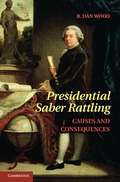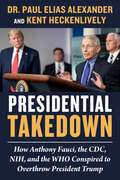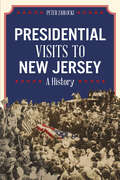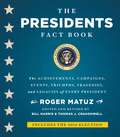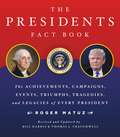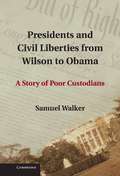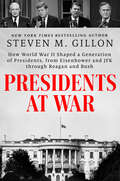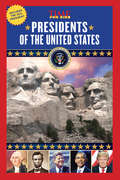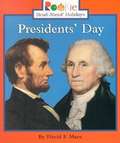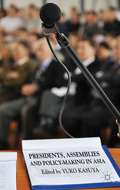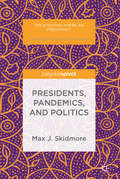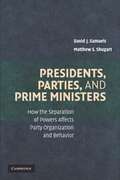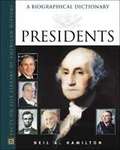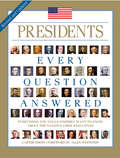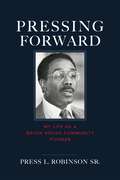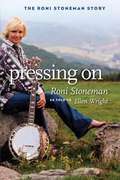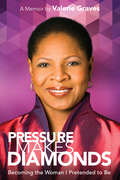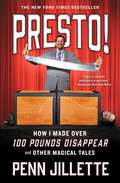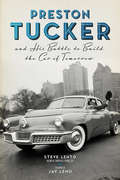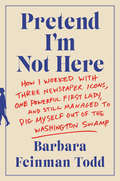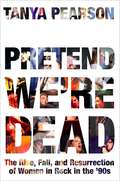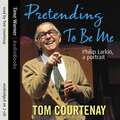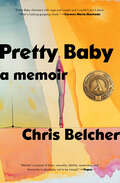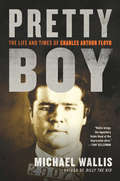- Table View
- List View
Presidential Saber Rattling
by B. Dan WoodThe founders of the American republic believed presidents should be wise and virtuous statesmen consistently advocating community interests when conducting American foreign policy. Yet the most common theoretical model used today for explaining the behavior of politicians is grounded in self-interest, rather than community interest. This book investigates whether past presidents acted as noble statesmen or were driven by such self-interested motivations as re-election, passion, partisanship, media frenzy and increasing domestic support. The book also examines the consequences for the nation of presidential behavior driven by self-interest. Between 1945 and 2008, presidents issued 4,269 threats to nineteen different countries. Professor B. Dan Wood evaluates the causes and consequences of these threats, revealing the nature of presidential foreign policy representation and its consistency with the founding fathers' intentions.
Presidential Takedown: How Anthony Fauci, the CDC, NIH, and the WHO Conspired to Overthrow President Trump
by Kent Heckenlively Dr. Paul Elias AlexanderAn explosive behind-the-scenes look at Donald Trump's final months in office and how the COVID crisis response was a carefully crafted plan to ruin him.In January 2020, Donald Trump was on the fast track to an easy re-election. While his first two years had been stymied by House Speaker Paul Ryan, Senate Majority Leader Mitch McConnell, and the Democrats, his third year had been one of remarkable success. The United States had low unemployment and was making strides across the globe. The president's rallies were well-attended, and he was being projected to win four hundred electoral votes and about forty-five states. Then came COVID-19.Dr. Paul Elias Alexander, former Senior Advisor to COVID Pandemic policy in the US government for President Trump and former COVID Pandemic evidence-synthesis advisor to WHO-PAHO, was on the frontlines to watch how Trump's world, and his reelection hopes, slowly collapsed leading up to November 2020—due to the CDC, NIH, and WHO conspiring to overthrow him with the worst response possible to the COVID crisis.Supported by emails and documents, career epidemiologist Alexander and New York Times-bestselling author Kent Heckenlively, JD, will not only show proof of a presidential takedown, but also of the personal vendetta of the CDC and HHS against Alexander himself. From unnecessary lockdowns, school closures, and mask mandates to the dismissal of effective treatments like hydroxychloroquine, ivermectin, and vitamin D and even threats against President Trump and his family, Presidential Takedown: How Anthony Fauci, the CDC, NIH, and the WHO Conspired to Overthrow President Trump is the inside story of what really happened from those first COVID-19 reports to President Trump's "loss" in November.
Presidential Visits to New Jersey: A History
by Peter ZablockiAll Hail the Chief in the Garden State Some, like Abraham Lincoln in 1861, came to garner support. Others, like N.J. Governor Woodrow Wilson in 1912, remained and rode that support to the White House. And still, others, like James Garfield in 1881, came to die. New Jersey's past is full of memorable Presidential visits - and home to some lesser-known ones. Thousands of people came out to support Teddy Roosevelt, his cousin Franklin D. Roosevelt, Dwight D. Eisenhower, and Lyndon B. Johnson. Others like Franklin Pierce, Benjamin Harrison, Ulysses S. Grant, and even more recently, Donald J. Trump saw the Jersey Shore as the perfect rest stop from the hustle and bustle of the capital. The story of these visits and others like them transcend politics to show the historical significance of not just the great men, but also that of the Garden State. Author Peter Zablocki presents the heated elections, political events, and critical moments of Presidents in New Jersey.
Presidents Fact Book Revised and Updated!
by Bill Harris Thomas J. Craughwell Roger MatuzIn time for the 2015 presidential election cycle, this revised paperback edition is the most comprehensive, up-to-date guide on the presidents and includes the milestones of Barack Obama's first and second terms.The Presidents Fact Book is a complete compendium of all things presidential and a sweeping survey of American history through the biographical lens of every president from George Washington to Barack Obama. Organized chronologically by president, each entry covers the major accomplishments and events of the presidential term; cabinet members, election results, groundbreaking legislation, and Supreme Court appointments; personality and personal habits; career before the presidency; a behind-the-scenes look at the wives, families, friends, and foes; and much more, including hobbies, odd behaviors, and outlandish penchants. Major primary documents from each administration--from the Bill of Rights to Barack Obama's speech on race in America--provide a glimpse into the crucial moments of America's storied past in the words of those who were at the helm. Perfect for students, history buffs, and political junkies, The President's Fact Book is at once an expansive collage of our nation's 44 individual presidents and a comprehensive view of American history.
Presidents Fact Book Revised and Updated!: The Achievements, Campaigns, Events, Triumphs, and Legacies of Every President from George Washington to the Current One
by Bill Harris Thomas J. Craughwell Roger MatuzAn All-New Edition! The Presidents Fact Book is a complete compendium of all things presidential and a sweeping survey of American history through the biographical lens of every president from George Washington through Donald Trump. Organized chronologically by president, each entry covers the major accomplishments and events of the presidential term; cabinet members, election results, groundbreaking legislation, and Supreme Court appointments; personality and personal habits; career before the presidency; a behind-the-scenes look at the wives, families, friends, and foes; and much more, including hobbies, odd behaviors, and outlandish penchants. Major primary documents from each administration-from the Bill of Rights to Barack Obama's speech on race in America-provide a glimpse into the crucial moments of America's storied past in the words of those who led the nation. Perfect for students, history buffs, and political junkies, The President's Fact Book is at once an expansive collage of our nation's 45 individual presidents and a comprehensive view of American history.
Presidents and Civil Liberties from Wilson to Obama
by Samuel WalkerThis book is a history of the civil liberties records of American presidents from Woodrow Wilson to Barack Obama. It examines the full range of civil liberties issues: First Amendment rights of freedom of speech, press, and assembly; due process; equal protection, including racial justice, women's rights, and lesbian and gay rights; privacy rights, including reproductive freedom; and national security issues. The book argues that presidents have not protected or advanced civil liberties, and that several have perpetrated some of worst violations. Some Democratic presidents (Wilson and Roosevelt), moreover, have violated civil liberties as badly as some Republican presidents (Nixon and Bush). This is the first book to examine the full civil liberties records of each president (thus, placing a president's record on civil rights with his record on national security issues), and also to compare the performance on particular issues of all the presidents covered.
Presidents at War: How World War II Shaped a Generation of Presidents, from Eisenhower and JFK through Reagan and Bush
by Steven M. GillonSteven M. Gillon, historian and New York Times bestselling author, is back with the story of how WWII shaped the characters and politics of seven American presidents.World War II loomed over the latter half of the twentieth century, transforming every level of American society and international relationships and searing itself onto the psyche of an entire generation, including that of seven American presidents: Dwight D. Eisenhower, John F. Kennedy, Lyndon B. Johnson, Richard Nixon, Gerald Ford, Ronald Reagan, and George H. W. Bush. The lessons of World War II, more than party affiliation or ideology, defined the presidencies of these seven men. They returned home determined to confront any force that threatened to undermine the war&’s hard-won ideals, each with their own unique understanding of patriotism, sacrifice, and America&’s role in global politics.In Presidents at War, Gillon examines what these men took away from the war and how they then applied it to Cold War policies that proceeded to change America, and the world, forever. A nuanced and deeply researched exploration of the lives, philosophies, and legacies of seven remarkable men, Presidents at War deftly argues that the lessons learned by these postwar presidents continue to shape the landscape upon which current and future presidents stand today.
Presidents of Our United States
by L. A. EslerFrom George Washington to Franklin delano Roosevelt, this book of biographical sketches of U.S. Presidents with accompanying pictures helps the reader get a snapshot of the times. There are many interesting facts about our Presidents. Who was a tailor before becoming a politician?
Presidents of the United States (America Handbooks, A Time For Kids Ser.)
by Editors of TIME For Kids MagazineTIME For Kids presents a complete overview of our nation's chief executives from George Washington to the newly elected 45th president!Did you know that James Monroe was the first president to appear without a wig in public? Or that George W. Bush appointed the first African-American secretary of state? Presidents of the United States invites the reader inside the White House to discover fascinating facts about the U.S. commanders-in-chief-their origins, accomplishments, and place in history-as told through famous quotes, important historical dates, and a timeline of events. Special sections cover the election process, the branches of government, and the role of presidents in the expansion of our nation from before the 13 colonies through westward expansion. With more than 200 photographs, illustrations, portrait reproductions, and maps.
Presidents' Day (Rookie Read-About Holidays)
by David F. MarxThis Rookie Read-About® Holidays book introduces children to Presidents' Day, a holiday that celebrates the birthdays of George Washington and Abraham Lincoln. Colorful photos and simple text encourage kids to read on their own as they learn about the heroic actions of these two United States presidents.
Presidents, Assemblies and Policy-making in Asia
by Yuko KasuyaThe authors assess the constitutional and partisan powers of Asian presidents, and analyse how they are used in actual policy-making processes. Country case studies on Afghanistan, Indonesia, the Philippines, South Korea, Sri Lanka, and Taiwan analyze how their constitutional and partisan powers are used in actual policy-making processes.
Presidents, Pandemics, and Politics
by Max J. SkidmoreThis book is an examination of the manner in which American presidents respond to pandemics and other public health crises. Skidmore argues that presidential performance in dealing with emergencies and pandemics varies, but those who are informed, focused, and confident that government can work are most likely to be successful. As an example, Gerald Ford's "Swine Flu program" is widely derided as incompetent and politically motivated. Closer examination, however, suggests the contrary, demonstrating the potential of government to act quickly and effectively against public health emergencies, even when facing formidable obstacles. The American government has a mixed record ranging from excellent to unacceptable, even counterproductive, in dealing with emergency threats to life and health. Despite ideological arguments to the contrary, however, governments are important to effective responses, and in the American setting, presidential action is essential.
Presidents, Parties, and Prime Ministers
by David J. Samuels Matthew S. ShugartThis book provides a framework for analyzing the impact of the separation of powers on party politics. Conventional political science wisdom assumes that democracy is impossible without political parties, because parties fulfill all the key functions of democratic governance. They nominate candidates, coordinate campaigns, aggregate interests, formulate and implement policy, and manage government power. When scholars first asserted the essential connection between parties and democracy, most of the world's democracies were parliamentary. Yet by the dawn of the twenty-first century, most democracies had directly elected presidents. Given this, if parties are truly critical to democracy, then a systematic understanding of how the separation of powers shapes parties is long overdue. David J. Samuels and Matthew S. Shugart provide a theoretical framework for analyzing variation in the relationships among presidents, parties, and prime ministers across the world's democracies, revealing the important ways that the separation of powers alters party organization and behavior - thereby changing the nature of democratic representation and accountability.
Presidents: A Biographical Dictionary
by Neil R. HamiltonThe president of the United States is a highly visible public figure, a bearer of immense responsibility, and the subject of intense scrutiny. He is held accountable for war, economic depression, domestic strife, national security, partisan politics, and overseas conflict. Presidents: A Biographical Dictionary closely examines the hopes and disappointments, the victories and defeats, and the integrity and weaknesses of the men who have held this office. Each of the profiles presented in this book traces the points at which presidential character, the exercise of power, and external events intersect. Presidents presents information suitable for exploratory research or for a casual reading of the history of the United States's chief executives and their legacies. Presidents contains 4 biographies and portraits of all the presidents, a chronology of the life of each president, suggested further reading about each president, an appendix that presents personal facts about the presidents, election results, and details of the presidential cabinets, a general bibliography and an index. Neil A. Hamilton holds a Ph.D. in history from the University of Tennessee and an M.A. and B.A. in history from the University of Miami. He is currently a professor of history at Spring Hill College in Mobile, Alabama. A member of the Author's Guild, Hamilton is the author or coauthor of eight nonfiction books, including The ABC-Clio Companion to the 1960s Counterculture in America and Militias in America: A Reference Handbook.
Presidents: Every Question Answered
by Carter SmithFrom George Washington to Barack Obama, an entertaining and educational overview of our nation’s chief executives.The highest office of our country has been a challenging one to occupy, from the times of a newly found nation to the global power seat it has become. Presidents: Every Question Answered reviews our leaders’ time in office and how their distinct characteristics became evident in the laws and improvements (or regressions) made during their terms. Biographical facts, First Ladies, and the administrative personnel that shared each president’s days are contained in these pages. Whether you’re a history major looking for extra credit, or just curious to know more about the melting pot of the United States, this book will give you insight and answers to your questions.
Pressing Forward: My Life as a Baton Rouge Community Pioneer
by Press Robinson Sr.In this down-to-earth memoir, longtime educator and community leader Press L. Robinson Sr. recounts his hardscrabble childhood in South Carolina, his education at Morehouse College and Howard University, his career as a professor and administrator in the Southern University system, and his activities as a community leader in Baton Rouge, Louisiana. The first elected Black member of the East Baton Rouge Parish School Board, Robinson consistently fought to level the playing fields for Black Americans and to better the social and physical environment of his adopted city.
Pressing On: The Roni Stoneman Story
by Ellen Wright Roni StonemanThe tragicomic life story of one of America's best-known country entertainers, told with warmth and honesty This book recounts the fascinating life of Roni Stoneman, the youngest daughter of the pioneering country music family, and a girl who, in spite of poverty and abusive husbands, eventually became "The First Lady of Banjo," a fixture on the Nashville scene, and, as Hee Haw's Ironing Board Lady, a comedienne beloved by millions of Americans nationwide. Drawn from over seventy-five hours of recorded interviews, Pressing On reveals that Roni is also a master storyteller. In her own words and with characteristic spunk and candor, she describes her "pooristic" ("way beyond 'poverty-stricken'") Appalachian childhood, and how she learned from her brother Scott to play the challenging and innovative three-finger banjo picking style developed by Earl Scruggs. She also warmly recounts Hee Haw-era adventures with Minnie Pearl, Roy Clark, and Buck Owens; her encounters as a musician with country greats including Loretta Lynn, Johnny Cash, June Carter, and Patsy Cline; as well as her personal struggles with shiftless and violent husbands, her relationships with her children, and her musical life after Hee Haw. A volume in the series Music in American Life
Pressure Makes Diamonds: Becoming the Woman I Pretended to Be
by Valerie Graves"When you get dealt a tough hand, you might choose to fold or you might decide to hold. If you're Valerie Graves, you reshuffle the whole damn deck...Graves's can't-stop-won't-stop energy offers a jump start toward meeting objectives and renews hope. Pressure Makes Diamonds is about more than overcoming."--Essence Magazine"This is the unflinching memoir of a Black woman’s journey from the projects of Motown-era Michigan to the skyscrapers of Madison Avenue and beyond."--New York Beacon"A gem of a book . . . Valerie Graves has spun an appealing narrative with a protagonist who reads like an African-American female counterpart of Horatio Alger. Her journey from Mud Lake, Pontiac, an exurb of Detroit, to a corner office on Madison Avenue is exhilarating, marking her rise to the upper echelons of advertising and providing readers with an exposé of her creative life and the world ruled by 'Mad Men.'"-- New York Amsterdam News"Graves paints the picture of how she was a determined woman who faked it till she made it--and made it big. [An] inspirational memoir."--Black EnterpriseLibrary Journal"Graves established herself as a fierce force in the advertising field and a greatly admired role model for black professionals establishing themselves in American business. In a moving book steeped in perseverance and empowering determination, the author fully embodies the challenges of her culture and those of being a motivated businesswoman . . . Optimistic and galvanizing, Graves' message of hope and hard work is timely and applicable."--Kirkus Reviews"Barrier-breaking, highly celebrated creative director and advertising executive Graves is about more than glittery and impressive national advertising campaigns and her association with international celebrities and various Fortune 500 companies . . . No one was looking for her, but she showed up, spoke directly to the public, and captured the world's attention. Graves' well-told tale, set against a detailed social and cultural backdrop, of courage and success both personally (including a happy marriage) and professionally is moving and inspiring."--Booklist"A story about an accomplished woman who is the epitome of grit . . . Whether recalling the guilt she felt as a working, absentee parent, or how she came to adopt new age thinking, the author's storytelling skills and use of humor, imagery, and figurative language is noteworthy. At an early age, Valerie decided she would fake it until she made it. Now a success by most standards, she no longer has to pretend. Anyone who enjoys reading about those who travel difficult paths in life will find Pressure Makes Diamonds to be inspirational."--Foreword ReviewsThis is the unflinching memoir of a female African American advertising executive's unprecedented and unlikely success, which began in the Mad Men era. It follows her journey from the projects of Motown-era Michigan to the skyscrapers of Madison Avenue and beyond. With marches, riots, and demonstrations as the backdrop, and rock 'n' roll as a soundtrack, this book accompanies Graves as she traverses the seismically shifting terrain of 1960s and '70s America on her quest to "be somebody."In the '80s and '90s, as Graves makes her ascent to the East Coast heights of the white male–dominated advertising world, she turns familiarity with harsh realities like racism and sexism into robust insights that deeply connect with African American consumers. During the golden era of black advertising, she becomes an undisputed "somebody." Soon, though, she learns that money, success, a good marriage, and connections that reach all the way to the White House cannot entirely insulate her against the social ills that threaten to crush black Americans.
Presto!: How I Made Over 100 Pounds Disappear and Other Magical Tales
by Penn JillettePenn Jillette’s New York Times bestselling account of his “extremely funny and somewhat profane journey to discovering a healthy lifestyle…that will motivate others to seek weight-loss solutions” (The Washington Post).More than three hundred and thirty pounds and saddled with a systolic blood pressure reading at dangerous heights, legendary magician Penn Jillette found himself at a crossroads. He needed a drastic lifestyle change if wanted to see his small children grow up. Enter Crazy Ray. A former NASA scientist and unconventional, passionate innovator, Ray Cronise changed Penn Jillette’s life with his wild “potato diet.” In Presto, Jillette takes us along on his journey from skepticism to the inspiring, life-changing momentum that transformed the magician’s body and mind. He describes the process in hilarious detail, as he performs his Las Vegas show, takes meetings with Hollywood executives, hangs out with his celebrity friends and fellow eccentric performers, all while remaining a dedicated husband and father. Throughout, he weaves in his views on sex, religion, and pop culture, making his story a refreshing, genre-busting account. Outspoken, frank, and bitingly clever, Presto is an incisive, rollicking read. In the end, it is “undeniably inspiring” (Booklist).
Preston Tucker and His Battle to Build the Car of Tomorrow
by Jay Leno Steve LehtoIn the wake of World War II, the U.S. automobile industry was fully unprepared to meet the growing demands of the public, for whom they had not made any cars for years. In stepped Preston Tucker, a salesman extraordinaire who announced the building of a revolutionary new car: the Tucker '48, the first car in almost a decade to be built fresh from the ground up. Tucker's car, which would include ingenious advances in design and engineering that other car companies could not match, captured the interest of the public, and automakers in Detroit took notice. Here, author Steve Lehto tackles Tucker's amazing story, relying on a huge trove of documents that has been used by no other writer to date. It is the first comprehensive, authoritative account of Tucker's magnificent car and his battles with the government. And in this book, Lehto finally answers the question automobile aficionados have wondered about for decades: exactly how and why the production of such an innovative car was killed.
Pretend I'm Not Here: How I Worked with Three Newspaper Icons, One Powerful First Lady, and Still Managed to Dig Myself Out of the Washington Swamp
by Barbara Feinman ToddAn accomplished former ghostwriter and book researcher who worked with Bob Woodward, Carl Bernstein, Ben Bradlee, and Hillary Clinton goes behind-the-scenes of the national’s capital to tell the story of how she survived the exciting, but self-important and self-promoting world of the Beltway.Barbara Feinman Todd has spent a lifetime helping other people tell their stories. In the early 1980s, she worked for Bob Woodward, first as his research assistant in the paper’s investigative unit and, later, as his personal researcher for Veil, his bestselling book about the CIA. Next she helped Carl Bernstein, who was struggling to finish his memoir, Loyalties. She then assisted legendary editor Ben Bradlee on his acclaimed autobiography A Good Life, and she worked with Hillary Clinton on her bestselling It Takes a Village. Feinman Todd’s involvement with Mrs. Clinton made headlines when the First Lady neglected to acknowledge her role in the book’s creation, and later, when a disclosure to Woodward about the Clinton White House appeared in one of his books. These events haunted Feinman Todd for the next two decades until she confronted her past and discovered something startling.Revealing what it’s like to get into the heads and hearts of some of Washington’s most compelling and powerful figures, Feinman Todd offers authentic portraits that go beyond the carefully polished public personas that are the standard fare of the Washington publicity factory. At its heart, Pretend I’m Not Here is a funny and forthcoming story of a young woman in a male-dominated world trying to find her own voice while eloquently speaking for others.
Pretend We're Dead: The Rise, Fall, and Resurrection of Women in Rock in the '90s
by Tanya Pearson"A refreshing and much-needed contribution to the male-dominated history of rock &’n&’ roll."--Kirkus ReviewsFrom the founder of the Women of Rock Oral History Project, an exploration of women in the '90s rock scene, featuring original interviews with Liz Phair, Shirley Manson, Kristin Hersh, Donita Sparks, Tanya Donelly, members of Hole, Luscious Jackson, Veruca Salt, Babes in Toyland, and more In 2018, during an interview with journalist Tanya Pearson, Shirley Manson lamented: "It&’s a blanket fact that after September 11th, nonconformist women were taken off the radio.&” This comment echoed a reality Pearson had personally witnessed as a musician and a fan, and launched her into a quest to figure out just what happened to these extraordinary female figures.PRETEND WE&’RE DEAD seeks to answer two big questions: First, where did all these wildly different, politically conscious, and supremely talented women in rock come from in the 1990s? And second, after their unprecedented breakout, why did they vanish from the mainstream by the early aughts? Along with analysis and narrative, PRETEND WE&’RE DEAD is built on exclusive interviews with the unfiltered voices of legends including: Shirley Manson, Melissa Auf der Maur, Patty Schemel, Kate Schellenbach, Nina Gordon, Louise Post, Josephine Wiggs, Tanya Donelly, Kristin Hersh, Tracy Bonham, Donita Sparks, Liz Phair, Zia McCabe, Tracy Bonham, Lori Barbero, Josephine Wiggs, and Jill Emery. Through thought-provoking conversations, these women explore how they fell in love with music and started bands; fought labels, their coverage in the media, and sexism; and wrote deeply political and feminist music. Readers also learn about the effects of Woodstock &’99, the corporatization of the music industry, the rise of Clear Channel and its ties to the Bush administration, and finally the nationalist sentiment after 9/11. While sonically diverse, these musicians all wrote fierce, socially conscious, feminist lyrics, and PRETEND WE&’RE DEAD commemorates and celebrates the overlooked contributions of true trailblazers.
Pretending To Be Me: Philip Larkin, A Portrait
by Tom CourtenayPRETENDING TO BE ME is an intimate, acerbic and occasionally scurrilous show about the poet, jazz aficionado and Hull University librarian, Philip Larkin.Larkin ('the magnificent Eeyore of British verse' - Daily Telegraph) has moved home; surrounded by packing cases, playing selections from his favourite jazz LPs, and making himself cups of tea - and later whiskies - he reflects wryly on writing and life.Hilarious and moving, the narrative shifts seamlessly between Larkin's outrageous wit and the poems, which Courtenay reads with powerful directness and simplicity.PHILIP LARKIN, one of the foremost figures in 20th-Century English poetry, feared his epitaph would be: 'They fuck you up, your mum and dad'. This, and other familiar poems, 'An Arundel Tomb', 'The Whitsun Weddings' and 'High Windows' are included in PRETENDING TO BE ME.
Pretty Baby: A Memoir
by Chris BelcherA queer teen rebel escapes small-town Appalachia and becomes Los Angeles&’s Renowned Lesbian Dominatrix in this searing and darkly funny memoir that upends our ideas about desire, class, and power. &“Pretty Baby is a muscular, canny memoir about labor and power and gender; it shimmers with rage and insight and I couldn&’t put it down. What a fucking gorgeous book.&” —Carmen Maria Machado, author of In the Dream House &“Chris Belcher&’s Pretty Baby reminds me why I fell in love with memoirs in the first place.&”—Saeed Jones, author of How We Fight for Our LivesThe dominatrix is the id of American femininity. She says the words that we all wish we could say when we find ourselves frozen in the presence of men. No is principal among them. So writes Chris Belcher, who appeared destined for a life of conventional femininity after she took first place in an infant beauty contest—a minor glory that can follow you around a working-class town of 1,600 people in rural West Virginia. But when she came out as queer, the conservative community that had once celebrated its prettiest baby turned on her. A decade later, living in Los Angeles and trying to stay afloat in the early years of a PhD program, Belcher plunges into the work of a pro domme. Branding herself as LA&’s Renowned Lesbian Dominatrix, she specializes in male clients who want a domme to make them feel worthless, shameful, and weak—all the abuse regularly heaped upon women for free. A queer woman whom men can trust with the unorthodox sides of their sexualities, Belcher is paid to be the keeper of the fantasies that they can&’t enact in their everyday relationships. But moonlighting as a sex worker also carries risks, like the not-so-submissive who tries to turn the tables and the jealous client out for revenge. As Belcher moves between the embodied world of the pro domme and the abstract realm of academia, she discovers how lessons from the classroom apply to the dungeon, and vice versa. Still, fear that her doctoral program won&’t approve burdens her with a double life. Pretty Baby is her second coming out. In this sharp and discerning memoir, we see through Belcher&’s eyes how power and desire can be renegotiated—or reinforced.
Pretty Boy: The Life and Times of Charles Arthur Floyd
by Michael Wallis"This engaging biography exactly and vividly catches the tone of a region, a time, and a man."--Larry McMurtry From the best-selling author of Billy the Kid and Route 66, a true-life story of a notorious outlaw that magnificently re-creates the vanished, impoverished world of Dust Bowl America. Michael Wallis evokes the hard times of the era as he follows the life of Charles "Pretty Boy" Floyd from his coming of age, when there were no jobs and no food, to his descent into a life of petty crime, bootlegging, murder, and prison. Before long he was one of the FBI's original "public enemies." After a series of spectacular bank robberies he was slain in an Ohio field in 1934 at the age of thirty. Pretty Boy is social history at its best, portraying, with a sweeping style, the larger story of the hardscrabble farmers whose lives were so intolerably shattered by the Depression.
